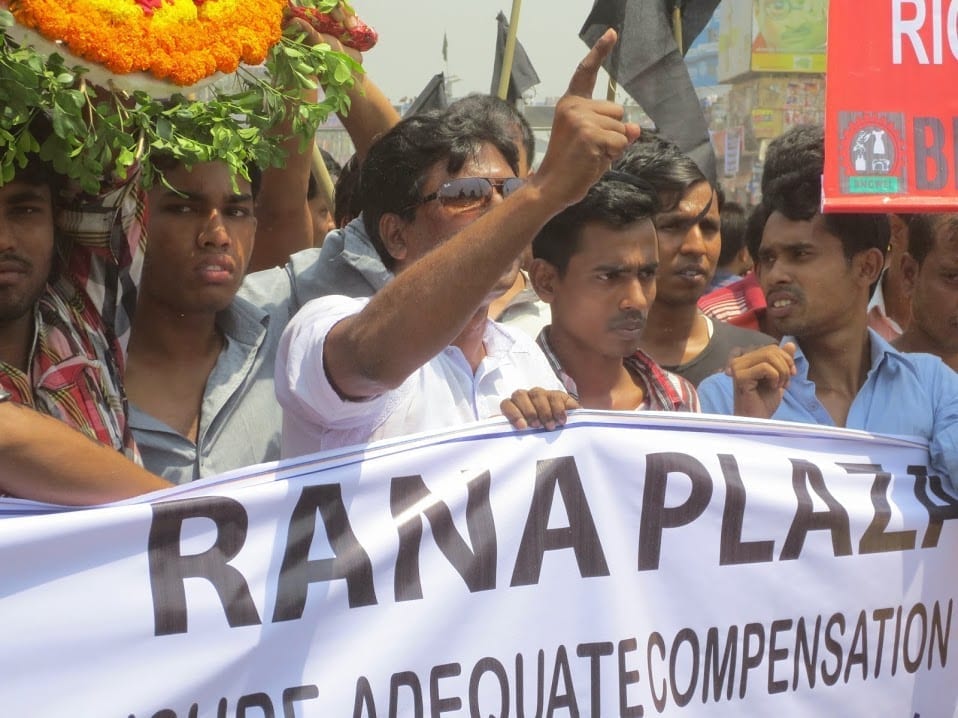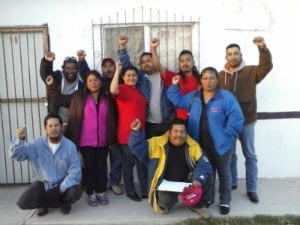Jun 30, 2013
In Tunisia, women helped spur protests that ended autocratic regimes in their country and throughout the Arabic-speaking world. Zimbabwe trade unionists fought years of economic deterioration with innovative research. Across the Dominican Republic, domestic workers challenged a male-dominated culture in a years-long struggle for rights and respect.
In each case, working people—in search of a government that is transparent and accountable, respects the rights of its citizens and acts to better all citizens’ economic circumstances—found innovative ways to challenge the status quo. In doing so, they became catalysts of change.
As part of a new, ongoing series, the Solidarity Center takes a close look at five examples where working people, their unions and civil society activists are advancing worker rights and greater equity in their societies, often under trying circumstances. Their experience and efforts provide concrete, transferable lessons for others seeking to effect positive change, and are highlighted in the Solidarity Center’s Catalysts for Change series, now available upon request.
In addition to the examples of citizen-worker action in Tunisia, Zimbabwe and the Dominican Republic, the series examines how a broad coalition stopped a regressive labor law from passage in Cambodia and looks at grassroots efforts to ensure Sri Lankan migrant workers know their rights and have legal and socioeconomic support when they work abroad. The series also includes three video clips based on interviews with Tunisian women activists.
“We cannot talk about democracy if we miss the sense of citizenship,” says Souha Miladi, a school teacher and union member active in the Tunisian uprising. But Miladi and the other worker-activists interviewed for this series all recognize that attaining broad-based democracy takes much more than individual effort. “We realized on our own we cannot actually influence the change,” says Dr. Godfrey Kanyenze, director of the Labor and Economic Development Research Institute of Zimbabwe (LEDRIZ). “To influence policies, we need a critical mass.”
Around the world, labor unions, worker organizations and citizen activists like Miladi and Kanyenze are joining together to advocate for fundamental human rights, ensure the voices and aspirations of workers are part of the national dialogue and advance policies that better serve civil society and promote equitable economic growth and humane development.
The full series includes five reports, each in English, Spanish, French and Arabic.

Jun 28, 2013
Workers in Bangladesh—especially millions of poorly paid garment workers who often risk their lives in dangerous factories—won a new tool to advance their rights when the United States suspended preferential trade benefits with the country.
Yesterday’s announcement that the United States suspended its Generalized System of Preferences (GSP) agreement with Bangladesh based on chronic and severe labor rights violations “is a rare and clear statement that affirms that worker rights and livelihoods are not expendable,” says Solidarity Center Executive Director Shawna Bader-Blau.
Because the benefits are suspended and not terminated, Bangladesh has the opportunity to again qualify for the GSP benefit by improving worker rights, laws and practices. A key measure of that program will be whether newly registered unions will be allowed to represent worker interests.
“Since 2005, over 1,800 workers have died in preventable factory fires and building collapses in the Bangladesh garment industry,” says AFL-CIO President Richard Trumka. “Workers died because the government and industry violated safety standards to cut costs, while global apparel brands demanded production at the lowest prices in the world. Bangladesh’s workers, many of them young women, need good jobs with strong worker protections, a voice at work and safe work places.”
Many of Bangladesh’s 4 million garment workers risk their lives every day, working in thousands of unregulated and often poorly constructed factories. Yet despite their contribution to the $19 billion garment industry, they are denied workplace rights and toil in workplace conditions reminiscent of the U.S. sweatshops of 100 years ago.
“This long-awaited decision is an important step for workers’ rights,” says International Trade Union Confederation (ITUC) General Secretary Sharan Burrow. “It sends a strong statement to all governments and employers that violation of the fundamental rights of workers will not be tolerated if a country expects to participate in the global economy.”
Although the Bangladesh government has for years talked about improving the situation for workers, in the past 15 months:
• Aminul Islam, a labor leader, was killed and his murder has gone unsolved.
• The Rana Plaza collapse killed more than 1,127 garment workers in April.
• The November Tazreen Fashions fire killed at least 112 garment workers.
• More than 45 fire incidents have occurred at Bangladeshi garment factories since Tazreen, according to data compiled by Solidarity Center staff in Dhaka, the capital.
The ITUC and AFL-CIO are calling on the government of Bangladesh to act urgently and deliberately to ensure that the rights of workers are respected in law and in practice. Bangladesh unions and worker rights advocates from around the world also are calling on corporations throughout the supply chain to sign and implement a binding agreement regarding workplace fire and building safety in Bangladesh.
The proposed Fire and Building Safety Agreement, already accepted by more than 60 major brands, guarantees worker participation, recognizes the role of government and takes measures to combat corruption by requiring rigorous inspections, transparent reporting of audits and public oversight of results.
For more than 15 years, the Solidarity Center has supported worker rights in Bangladesh.
Jun 22, 2013
Some 197 million people were jobless worldwide in 2012, and an additional 39 million workers have dropped out of the labor market, unable to find employment, according to a new report by the International Labor Organization (ILO).
The ILO predicts the situation will only get bleaker this year, with 5.1 million more workers likely to be unemployed. Young people are the hardest hit: 74 million young workers worldwide are unemployed, a staggering 40 percentof those unemployed globally.
“Global Employment Trends 2013” notes that although the global economy is expected to recover, growth will not be strong enough to bring down unemployment quickly, and predicts that unemployment worldwide will remain at 6 percent up to 2017, not far from its worst level in 2009. The number of unemployed workers is expected to rise further to some 210.6 million over the next five years.
Read the full report.
Jun 20, 2013

Ten workers fired for union activity have refused severance pay. Credit: CFO
An international auto parts production plants has violated worker rights numerous times with actions that include a retaliatory mass firing and interference with union elections, according to a new report by the Worker Rights Consortium (WRC).
Since August 2011, the actions of Arneses y Accesorios de Mexico have “represented serious and clear-cut violations of international labor standards as embodied in the conventions of the International Labor Organization, as well as the codes of conduct of several of PKC’s customer firms,” according to the report.
In December, the Finnish-owned PKC fired more than 100 union supporters at Arneses y Accesorios, including the entire union committee, for campaigning for the election of an independent trade union, the National Union of Mine and Metalworkers (known as “Los Mineros”), a Solidarity Center partner, at their plants in Ciudad Acuña, Mexico. According to Los Mineros, the “workers were called individually to the human resources office and told to sign a ‘voluntary’ resignation letter. Officials of the Federal Labor Board were present and encouraged the workers to sign.” The union says workers were told that “the company has decided it no longer needs your services.”
The report found that the company denied workers the opportunity to exercise their right to freely join a union and bargain collectively by:
• Installing a so-called protection contract with the Confederación de Trabajadores de México (Confederation of Workers of Mexico, CTM), and subsequently using the agreement to prevent workers from freely exercising their associational rights. The CTM is a labor organization with a history of acting as “protection union” by assisting employers in blocking independent unionization efforts.
• Engaging in anti-union harassment and intimidation in the lead-up to a union election in October 2012. Such actions included directing managers to issue anti-union threats and hold captive audience meetings to dissuade workers from joining Los Mineros.
• Manipulating the union election by hiring short-term employees and directing them to vote for CTM.
The report also documented sexual harassment of women workers, who “provided credible testimony that Arneses y Accesorios managers pressured them to engage in sexual relations in exchange for promotions or other work benefits.”
The 20-page report lists recommendation for restoring worker rights at Arneses y Accesorios, which include immediately reinstating all workers dismissed in retaliation for exercising their right to freely associate and providing them with back pay.
Read the full report.
Jun 18, 2013

An Egyptian court overturned a guilty verdict against EDLC President Yousri Maarouf for union activities. Credit: IndustriALL
An Egyptian court overturned jail sentences for five trade unionists arrested after they went out on strike at the Alexandria Container & Cargo Handling Company, according to the Egyptian Democratic Labor Congress (EDLC). Yousri Maarouf, EDLC president, faced three years imprisonment for leading dockworkers in a struggle for decent employment conditions.
The court ruled yesterday that Maarouf and his colleagues were innocent because “sit-ins and strikes are guaranteed by the constitution and the defendants simply exercised this right.” In doing so, the court recognized that workers have to right to strike under Egyptian law, and that no worker should be imprisoned for this act.
Egypt’s 2003 Labor Law recognized the right to strike for the first time, although it imposed many restrictions.
The charges against Maarouf stemmed from October 2011, when he led 1,500 workers on strike, bringing the port facility to a standstill. Maarouf received international support in his campaign for justice from the global union,IndustriALL and other trade unions around the world. Maarouf was elected president of the EDLC by representatives of more than 186 independent unions at EDLC’s founding congress in April.



